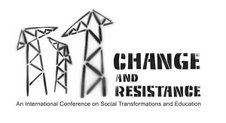M. Lane Bruner is currently Associate Professor of Critical Political Communication and Graduate Director of the doctoral program in Public Communication at Georgia State University in Atlanta, Georgia in the United States. He is the author of Strategies of Remembrance: the Rhetorical Dimensions of National Identity Construction, and Market Democracy in Post-Communist Russia (co-edited with Professor Viatcheslav Morozov of St. Petersburg State University, Russia). Professor Bruner is also the author of over education. Over the last decade, the East-European system of education has experienced through a wide-ranging modernization.
"Resistance is futile," or at least so we are told by the Borg in various Star Trek episodes, by Douglas Adams in The Hitchhiker's Guide to the Galaxy, by characters on television shows like Doctor Who and Lost in Space, and on British television series such as Space: 1999. Like the theme of US filmmakers who brought us The Truman Show and The Matrix, which focused on individuals living in world's they thought were real but in fact were fabrications, one wonders why the notion of the futility of resistance has been such a persistent theme in Western science fiction over the last few decades.
It is a well known fact that capitalism absorbs and commodifies dissent, and that consumer culture oftentimes is a direct threat to notions of informed citizenship and public deliberation. It is also well known that a wide range of neo-liberals argue that "market democracy" is the highest form of human political achievement, and that, while resistance may not be futile, it is, at least in "advanced" market democracies, unnecessary. After all, what IS there to resist when one enjoys freedom of religion, freedom of speech, freedom of travel, freedom of assembly, etc?
And what good can be achieved from large scale political resistance? Those familiar with political history know that "revolutions" tend to replace one form of domination with another, as particular factions within a given polity claim to represent the interests of all (when they do not), and that "rebellion" is usually a term relegated to those moments of mass political dissent that are ultimately crushed by the powers that be. In light of such observations, is "resistance" futile? What might "productive resistance" even look like in the New World Order, and, even if forms of productive resistance were possible, how might citizens of the world be taught to engage in such resistance?
The essay I propose for inclusion for the International Conference on Social Transformation is an attempt to explore these questions in light of the global collapse of communism, the consequent global rise of neo-liberalism and religious fundamentalism, and the ongoing processes of "nation-building" around the world. Drawing heavily upon contemporary critical rhetorical theory, discourse theory, and radical democratic theory, and drawing upon contemporary political events in locations as diverse as Venezuala, Russia, Iraq and the United States, I will provide a working definition for "productive" resistance, theoretically complicate such terms as "deliberation," "phronesis," and "democracy," while simultaneously anchoring my prescriptions for progressive political action in the New World Order in concrete economic analyses of the historical relationship between classical republicanism, finance, and empire.
Subscribe to:
Post Comments (Atom)

No comments:
Post a Comment